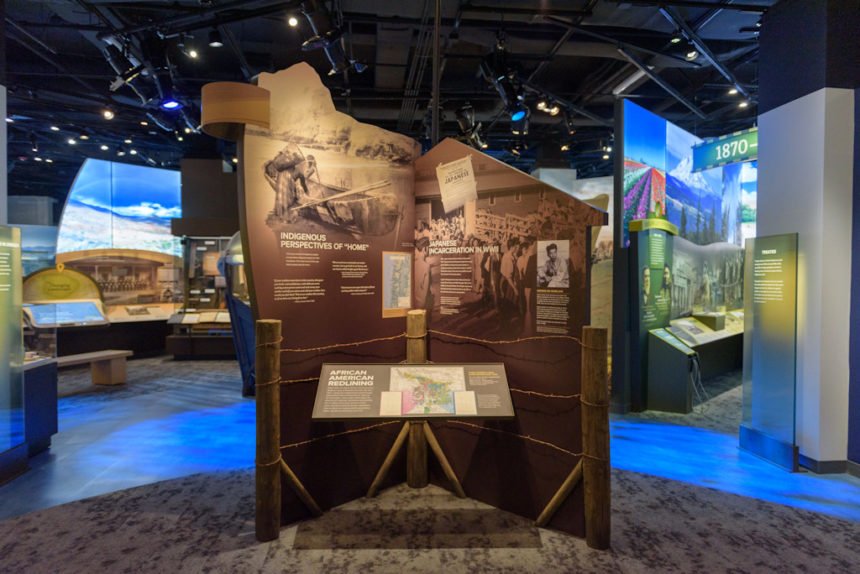Oregon Historical Society Museum reopens to public Saturday

PORTLAND, Ore. (KTVZ) -- Nearly four months after it closed, the Oregon Historical Society plans to reopen its museum to the public on Saturday at 10 a.m. Following reopening, public museum and store hours will be Wednesdays – Saturdays from 10 a.m. – 5 p.m. and Sundays from 12 p.m. – 5 p.m.
The OHS Research Library remains closed for renovations that began in January. More information on library services that are available during the renovation can be found at ohs.org/libraryreno.
Following the guidance and requirements of the Oregon Health Authority (OHA) for cultural attractions and museums, the Oregon Historical Society has implemented important safety protocols for the health of our staff and visitors. New safety protocols are detailed at the bottom of this press release as well as at ohs.org/reopening.
When the Oregon Historical Society closed on Saturday, March 14, the museum was about to debut a new original exhibition, Nevertheless, They Persisted: Women’s Voting Rights and the 19th Amendment, which chronicles the complicated history of woman suffrage and broad voting rights and profiles the brave activists who fought for woman suffrage. Now extended through mid-2021, this exhibit shows the many ways Oregon history connects to the national history of woman suffrage and to the complex history of American democracy.
“In this election year, Nevertheless, They Persisted will prompt visitors to reflect on voting rights and the many ways that activists have fought to universalize this basic right of citizenship,” said OHS Executive Director Kerry Tymchuk. “We were excited to open this exhibition in March, and four months later, the important messages of the power of activism shared in Nevertheless, They Persisted feel even more relevant today.”
Oregon women gained the right to vote in 1912, the initiative passing with a 52% majority after five prior failed attempts spanning nearly 30 years. It was not until the ratification of the 19th Amendment in 1920, however, that women across the country gained the right to vote in local and national elections. Even then, these rights did not extend to all women — restrictions on citizenship continued for Native Americans and first-generation Asian Americans well into the twentieth century, and frequently used voter-suppression methods were outlawed by the 1965 Voting Rights Act (itself weakened by the 2013 Supreme Court decision in Shelby County v. Holder).
Nevertheless, They Persisted, and the Oregon Historical Society’s recently renovated permanent exhibition, Experience Oregon, give visitors an honest, and often difficult, look at our state’s history. In a recent statement on racial justice and equality, Tymchuk and OHS Board President Mary Faulkner wrote, “The Oregon Historical Society recommits itself to being a valuable resource by documenting, preserving, and sharing our state’s history, from all perspectives, and in all its complexities. We hope that everyone will continue to help guide us in providing knowledge of the past and working to build a more just and equitable society in the future.”
The Oregon Historical Society is excited to re-open its museum to share these exhibitions with visitors, while continuing its efforts to provide programs and content virtually for those who are not able to visit in person. For a full schedule of upcoming virtual programs, visit ohs.org/events, and to read up on what has been keeping OHS staff-members busy during our closure, visit ohs.org/blog.
New Health and Safety Protocols
Visitors to the Oregon Historical Society will be asked to adhere to the following guidelines in an effort to keep our staff and visitors as safe as possible:
Wear A Face Covering: Pursuant to the Governor’s executive order, all visitors age twelve and older are required to wear a face covering. In compliance with ADA requirements, guests who have a physical or mental health condition, including disability, that prevents them from putting on, taking off, or wearing a face covering or are unable to wear a face covering for medical reasons will be exempt. If visitors do not have a face covering, single-use face coverings will be provided at no charge.
Maintain Distance: Signage through the museum will remind visitors to keep six feet of distance between themselves and visitors outside of their party. Per OHA guidelines, groups of up to 10 within the same party are not required to maintain six feet of physical distance.
Modified Exhibit Access: For the safety of our visitors, high touch hands-on interactive features in open exhibitions are closed until further notice. Our History Hub exhibit will be closed due to the hands-on nature of this exhibition, as will our Photo Hallway gallery due to the inability for visitors to easily maintain six feet of distance.
Museum Store: The Oregon Historical Society Museum Store will maintain the same public hours as the museum. During this time, there will be a limit of four customers in the store at one time. We are eager to welcome shoppers back to the museum store, as all sales in our store provide critical funding in support of our mission.
Other Safety Precautions Include:
- Additional hand sanitizing stations installed at the museum’s entrance and throughout the building;
- Plexiglas sneeze guards installed at point of sale stations;
- Designated one-way paths to maintain required distancing as visitors enter, exit, and enjoy our exhibitions;
- Limited contact transactions; at this time, we will be discouraging cash/check transactions; and
- Limiting building capacity to a maximum of 150 visitors in the museum at one time.
About the Oregon Historical Society
For more than a century, the Oregon Historical Society has served as the state’s collective memory, preserving a vast collection of artifacts, photographs, maps, manuscript materials, books, films, and oral histories. Our research library, museum, digital platforms & website (www.ohs.org), educational programming, and historical journal make Oregon’s history open and accessible to all.We exist because history is powerful, and because a history as deep and rich as Oregon’s cannot be contained within a single story or point of view.